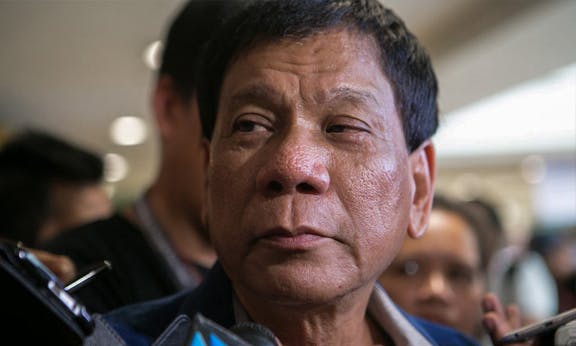One-sided analysis of the Philippines

Ben Reid’s analysis (Red Flag #71) of the Philippines election is surprisingly thin. The article stresses the “likely” continuities between the current administration and Duterte’s future presidency. Actually, his election is a significant development in the crisis of Philippine politics.
Reid points out that Duterte was supported by local capitalists and warlords, which is true – but he had considerably more than “local support”; he has gathered a powerful social bloc of sections of the ruling, middle and working classes all over the country. His victory would not have been possible if his support did not extend outside of Davao. This was more than electoral support – it was a social mobilisation. This is the first time any politician from Mindanao has achieved this kind of political significance.
Reid says that Aquino’s administration achieved little social or political reforms. True enough from the left’s perspective, but it misses the importance of the last six years for the ruling class.
Aquino’s position as president faced no serious challenges. Furthermore, GDP grew consistently. Consistent economic growth and six years of more or less unquestioned legitimacy for the sitting president are an achievement as far as Philippine politics goes.
This is not to be soft on Aquino. Throughout that time, inequality worsened, organised labour was attacked, and the peace process in Mindanao was utterly bungled. But why did so many significant sections of the ruling class revolt against Aquino’s Liberal Party?
Reid argues that Duterte “is likely to continue Aquino’s tactics of negotiations while continuing military action to limit the conflict between Manila and Bangsamoro independence groups in the country’s south”. Duterte is part of a different fraction of the ruling class to the Manila oligarchs. He supported peace with the Moros even in the days of Estrada’s all-out war. He has also been explicit that no peace can be achieved without the participation of all the armed groups. He advocates federalism – not only as a solution to the conflict in Mindanao, but to many of the problems faced by the provinces.
Once he becomes president, Duterte may well find himself forced to copy Aquino’s tactics regarding the Bangsamoro – but he may also be serious about federalism. Federalism makes sense for his section of the ruling class. It wouldn’t mean peace; it would mean making a section of the Bangsamoro responsible for pacifying other sections. But it would be a change, and an important one.
“[I]t is unlikely that any major progress will be made in negotiating a cease-fire with rebels or implementing substantial social reforms that the NPA insists are prerequisites for peace.” But now he has offered them cabinet positions. Duterte is popular among the insurgents in Mindanao, and many of them will want the party to take the offer. Sison might as well. If so, the communist leadership would be deputised against their own reform demands. This could split the party. If the leadership reject the offer, they could still alienate themselves from the sections in Mindanao (where the NPA is strongest).
A section of the ruling class has revolted against the entrenched Manila oligarchy. It stirred up the wealthy middle classes, the working class, the farmers and the street-dwelling poor. A rally for a politician from Mindanao drew more than a million people in the heart of Manila. These people cheered as he promised “real change” bought with blood.
We may well get more of the same, although the money and privilege might flow to different parts of the ruling class. But we might be entering a new and very dangerous and volatile situation. At the moment, it is too soon to tell. Surely it is extremely one sided to emphasise continuity at the expense of what is different (or may wind up being different). And in any case, doesn’t the “likely” continuity also suggest that the political crisis that thrust Duterte into national significance has not been resolved?